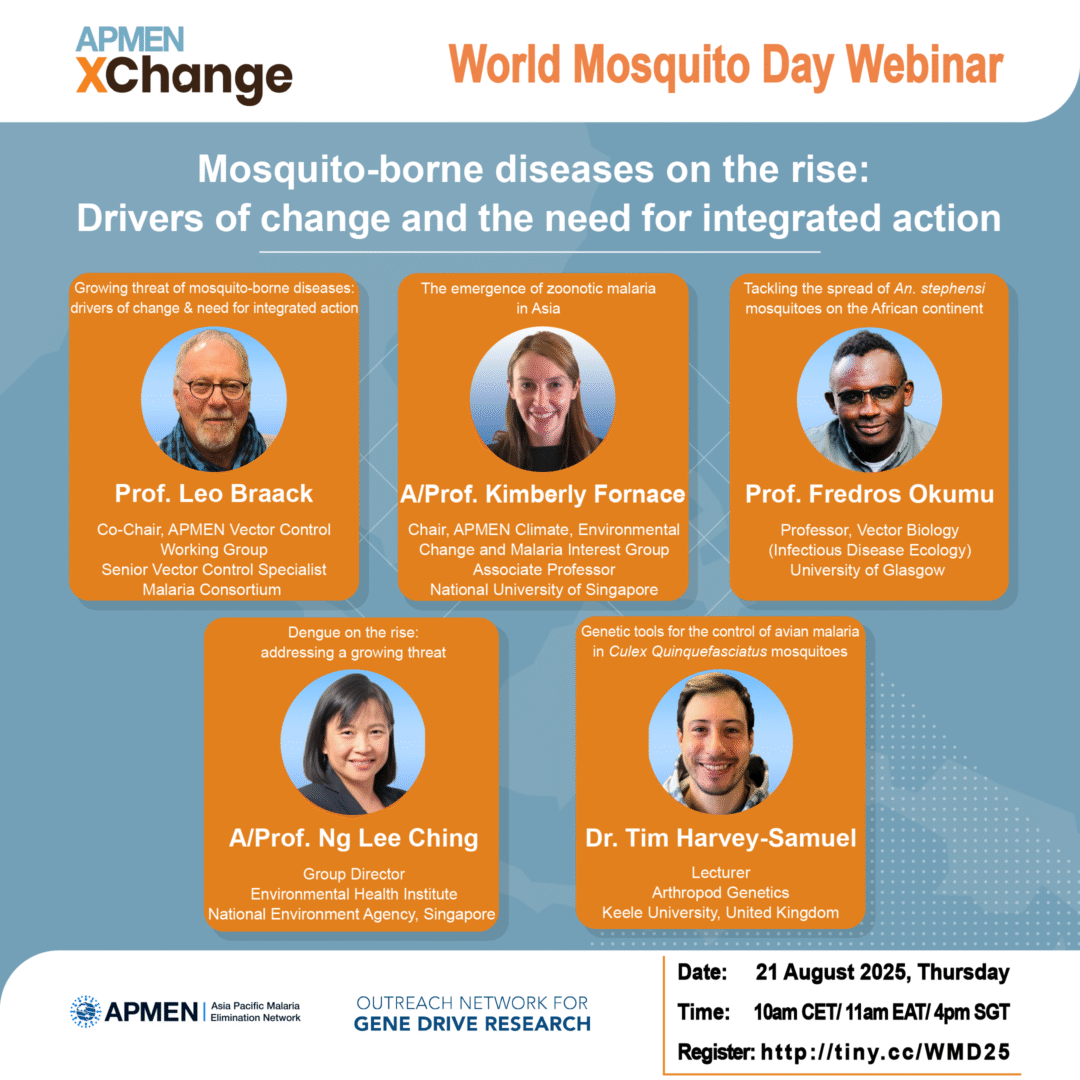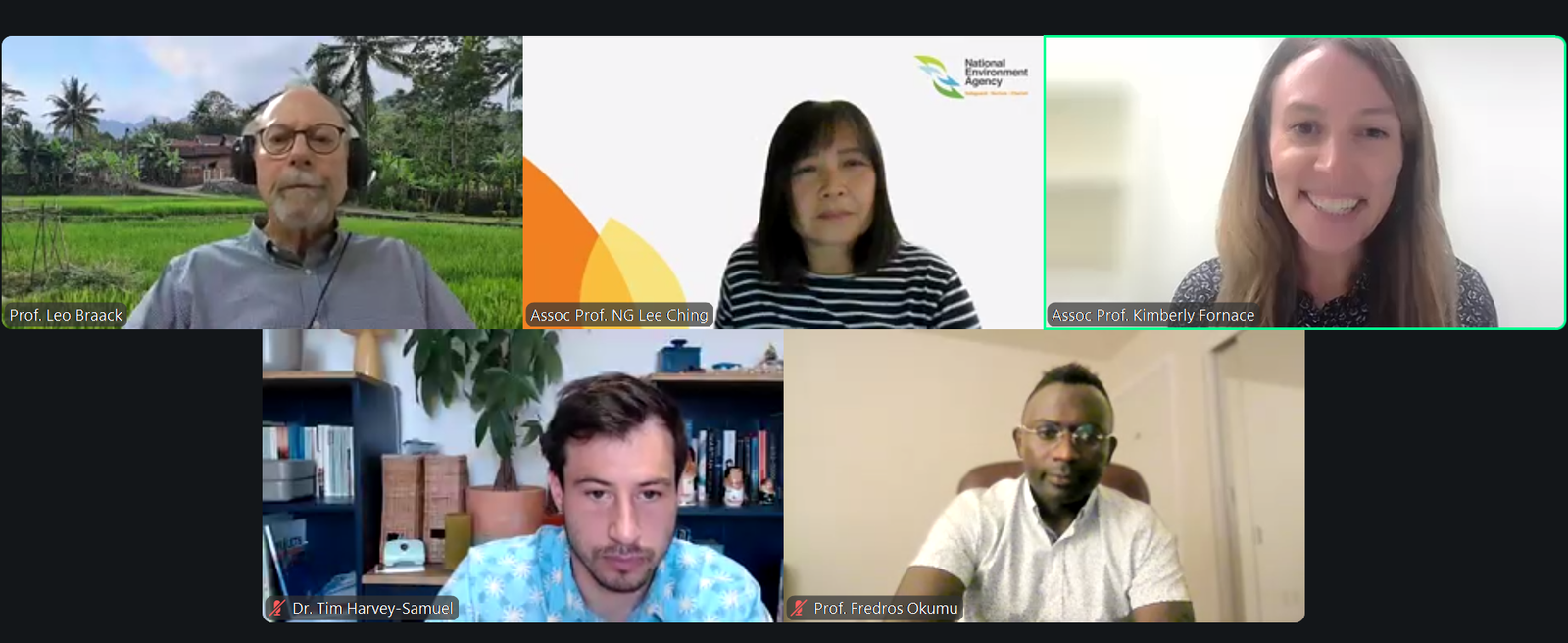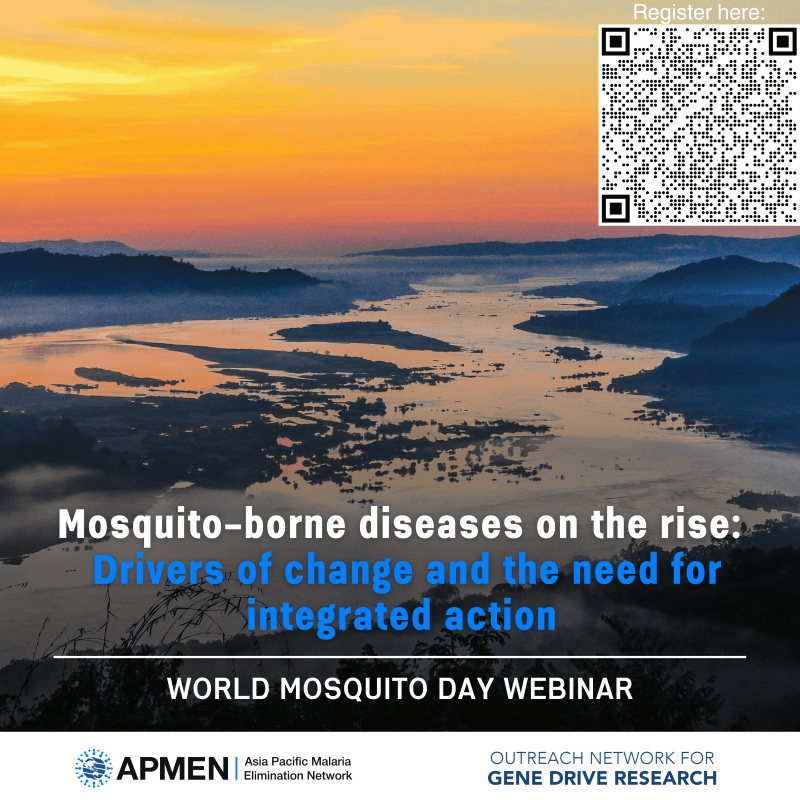This article was originally published on apmen.org
On August 21, APMEN and the Outreach Network for Gene Drive Research co-hosted a special APMENxChange webinar to commemorate World Mosquito Day. The event, titled “Mosquito-borne diseases on the rise: Drivers of change and the need for integrated action,” brought together global experts to discuss how climate change, deforestation, urbanization, and biodiversity loss are reshaping mosquito-borne disease dynamics across the world. This timely session highlighted the urgent need for cross-sectoral collaboration, innovative tools, and integrated surveillance systems to address both emerging and re-emerging threats.

Why This Webinar Was Held
Mosquito-borne diseases are increasing in prevalence, posing significant challenges to public health and biodiversity. Rising temperatures and shifting weather patterns caused by climate change are expanding mosquito habitats, while deforestation and land-use changes are driving closer contact between humans and wildlife, creating new pathways for disease spillover. Urbanization has added another layer of complexity, especially in the context of dengue and the spread of invasive vectors such as Anopheles stephensi. Diseases like zoonotic malaria in Asia and avian malaria threatening Hawaiian birds exemplify the interconnectedness of human, animal, and environmental health. Against this backdrop, the webinar aimed to raise awareness, promote integrated responses, and foster regional and global dialogue on effective interventions.
A Truly Global Reach
The webinar attracted 1,104 registrations from 99 countries, with 556 participants joining live from 77 countries. The participants represented a range of sectors including government agencies (31%), academic and research institutions (42%), and NGOs (14%). Gender representation was balanced, with 42% female, 57% male, and 1% preferring not to say. There was a high level of engagement throughout the event, evidenced by over 50 questions submitted via the Q&A box and numerous comments and discussions in the chat. In the live polling, 98% rated the webinar as useful (excellent or good), and 97% expressed interest in attending future APMEN webinars.

Expert Panel: Four Perspectives, One Health
The webinar was moderated by Dr Leo Braack, Chair of APMEN Vector Control Working Group and Senior Technical Specialist from Malaria Consortium. A central feature of the webinar was its expert panel, which showcased diverse perspectives on One Health approaches to mosquito-borne diseases.
Dr Kimberly Fornace: The Emergence of Zoonotic Malaria in Asia
Dr Fornace, Associate Professor at the National University of Singapore and Chair of APMEN’s Climate, Environmental Change and Malaria Interest Group, presented compelling findings on the rise of Plasmodium knowlesi zoonotic malaria in Southeast Asia. She highlighted how deforestation and fragmented landscapes are driving spillover events and emphasized the need for surveillance and control strategies that integrate wildlife, environmental, and human health data. Dr Fornace underscored that while there is currently no evidence of sustained human-to-human transmission, cross-sectoral collaboration remains essential for addressing zoonotic transmission amid unprecedented environmental change.
Dr Fredros Okumu: The rising threat of Anopheles stephensi in Africa
Dr Okumu, Professor of Vector Biology at the University of Glasgow and former Director of the Ifakara Health Institute, addressed the escalating threat of Anopheles stephensi in Africa. This invasive urban vector poses a serious risk of increasing malaria transmission in cities across the continent. Prof Okumu emphasized the need to scale up larval source management, enforce regulations on water storage and construction, strengthen surveillance systems, and adopt more integrated and multisectoral approaches to control its spread.
Dr Lee Ching Ng: Dengue on the Rise – Addressing a Growing Threat
Dr Ng, Group Director of the Environmental Health Institute at Singapore’s National Environment Agency, shared Singapore’s success story in dengue prevention through the innovative Project Wolbachia. This integrated approach, combining environmental management, community engagement, and targeted biological control, has reduced Aedes aegypti populations by up to 90% and lowered dengue risk by over 70% in treated areas. She shared the importance of managing public expectations, ensuring sufficient local entomological expertise, and fostering strong regulatory support when scaling similar interventions in other countries.
Dr Tim Harvey-Samuel: Genetic Tools for Controlling Avian Malaria
Dr Harvey-Samuel, Lecturer in Arthropod Genetics at Keele University, presented cutting-edge research on gene drive technologies aimed at controlling Culex quinquefasciatus mosquitoes, the vector responsible for avian malaria in Hawai‘i and other biodiversity hotspots. He provided an overview of the gene drive system his team is developing to make these mosquitoes unable to transmit the avian malaria parasite, a potential promising approach for both conservation and vector control.

Active Engagement and Knowledge Sharing
The webinar concluded with a lively Q&A session, where participants posed insightful questions on topics including the spread P. knowlesi beyond Asia, the cost-effectiveness and scalability of Wolbachia programmes, the integration of vector surveillance with biodiversity conservation, and the regulatory pathways for novel genetic tools. The webinar recording is available online for wider access.
The webinar reminded us of the increasing array of complex challenges that confront humanity and our environment, and the need to seek integrated solutions that draw on a One Health approach. To deal with expanding disease, and escalating Climate Change impacts, we have to adapt our comfort zones, be innovative, be nimble in seeking technological and social responses. – Dr Leo Braack, Chair of APMEN Vector Control Working Group and Senior Technical Specialist from Malaria Consortium.
The Way Forward: APMEN’s Commitment to One Health
Moving forward, APMEN reaffirms its commitment to advancing a One Health approach to malaria and other mosquito-borne diseases in collaboration with other partners such as the Outreach Network for Gene Drive Research. This includes strengthening cross-border and regional surveillance for zoonotic and invasive vectors, facilitating peer-to-peer learning among national malaria programmes, and supporting the testing and responsible scale-up of innovative tools such as Wolbachia, larval source management, and gene drive technologies. By fostering collaboration between human, animal, and environmental health sectors, APMEN continues to play a leading role in helping member countries progress towards malaria elimination while addressing the emerging challenges posed by climate change, biodiversity loss, and urbanization.
